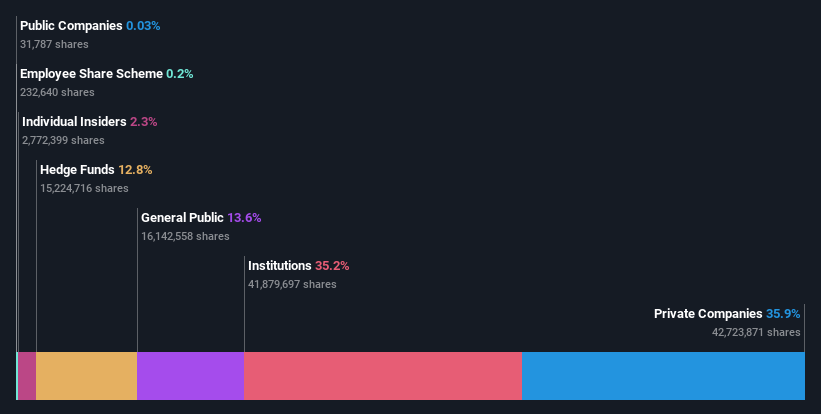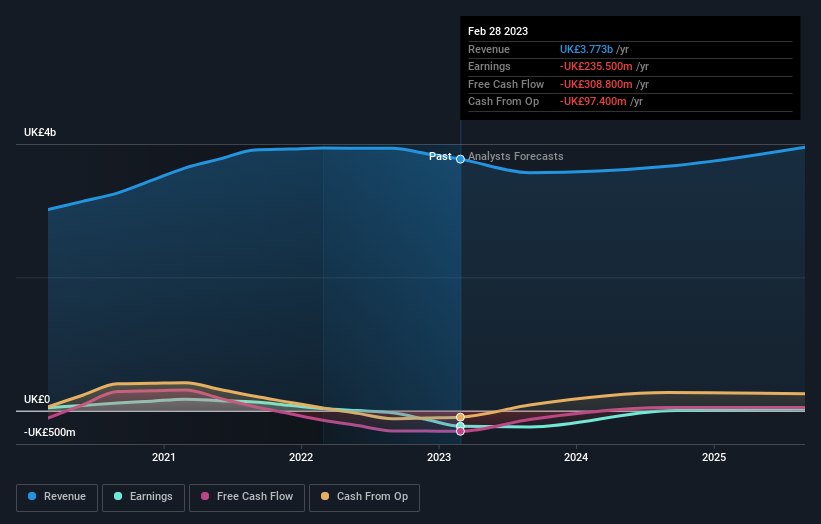- United Kingdom
- /
- Specialty Stores
- /
- LSE:ASC
Both private companies who control a good portion of ASOS Plc (LON:ASC) along with institutions must be dismayed after last week's 8.4% decrease

Key Insights
- Significant control over ASOS by private companies implies that the general public has more power to influence management and governance-related decisions
- The top 4 shareholders own 53% of the company
- Insiders have sold recently
To get a sense of who is truly in control of ASOS Plc (LON:ASC), it is important to understand the ownership structure of the business. We can see that private companies own the lion's share in the company with 36% ownership. In other words, the group stands to gain the most (or lose the most) from their investment into the company.
While institutions who own 35% came under pressure after market cap dropped to UK£462m last week,private companies took the most losses.
Let's take a closer look to see what the different types of shareholders can tell us about ASOS.
See our latest analysis for ASOS

What Does The Institutional Ownership Tell Us About ASOS?
Institutional investors commonly compare their own returns to the returns of a commonly followed index. So they generally do consider buying larger companies that are included in the relevant benchmark index.
As you can see, institutional investors have a fair amount of stake in ASOS. This can indicate that the company has a certain degree of credibility in the investment community. However, it is best to be wary of relying on the supposed validation that comes with institutional investors. They too, get it wrong sometimes. If multiple institutions change their view on a stock at the same time, you could see the share price drop fast. It's therefore worth looking at ASOS' earnings history below. Of course, the future is what really matters.

It looks like hedge funds own 13% of ASOS shares. That catches my attention because hedge funds sometimes try to influence management, or bring about changes that will create near term value for shareholders. Our data shows that Bestseller United A/S is the largest shareholder with 25% of shares outstanding. For context, the second largest shareholder holds about 13% of the shares outstanding, followed by an ownership of 11% by the third-largest shareholder.
Our research also brought to light the fact that roughly 53% of the company is controlled by the top 4 shareholders suggesting that these owners wield significant influence on the business.
While studying institutional ownership for a company can add value to your research, it is also a good practice to research analyst recommendations to get a deeper understand of a stock's expected performance. Quite a few analysts cover the stock, so you could look into forecast growth quite easily.
Insider Ownership Of ASOS
While the precise definition of an insider can be subjective, almost everyone considers board members to be insiders. Management ultimately answers to the board. However, it is not uncommon for managers to be executive board members, especially if they are a founder or the CEO.
Most consider insider ownership a positive because it can indicate the board is well aligned with other shareholders. However, on some occasions too much power is concentrated within this group.
Shareholders would probably be interested to learn that insiders own shares in ASOS Plc. In their own names, insiders own UK£11m worth of stock in the UK£462m company. This shows at least some alignment. You can click here to see if those insiders have been buying or selling.
General Public Ownership
With a 14% ownership, the general public, mostly comprising of individual investors, have some degree of sway over ASOS. While this group can't necessarily call the shots, it can certainly have a real influence on how the company is run.
Private Company Ownership
It seems that Private Companies own 36%, of the ASOS stock. It might be worth looking deeper into this. If related parties, such as insiders, have an interest in one of these private companies, that should be disclosed in the annual report. Private companies may also have a strategic interest in the company.
Next Steps:
I find it very interesting to look at who exactly owns a company. But to truly gain insight, we need to consider other information, too. For example, we've discovered 4 warning signs for ASOS (1 is potentially serious!) that you should be aware of before investing here.
If you are like me, you may want to think about whether this company will grow or shrink. Luckily, you can check this free report showing analyst forecasts for its future.
NB: Figures in this article are calculated using data from the last twelve months, which refer to the 12-month period ending on the last date of the month the financial statement is dated. This may not be consistent with full year annual report figures.
If you're looking to trade ASOS, open an account with the lowest-cost platform trusted by professionals, Interactive Brokers.
With clients in over 200 countries and territories, and access to 160 markets, IBKR lets you trade stocks, options, futures, forex, bonds and funds from a single integrated account.
Enjoy no hidden fees, no account minimums, and FX conversion rates as low as 0.03%, far better than what most brokers offer.
Sponsored ContentNew: Manage All Your Stock Portfolios in One Place
We've created the ultimate portfolio companion for stock investors, and it's free.
• Connect an unlimited number of Portfolios and see your total in one currency
• Be alerted to new Warning Signs or Risks via email or mobile
• Track the Fair Value of your stocks
Have feedback on this article? Concerned about the content? Get in touch with us directly. Alternatively, email editorial-team (at) simplywallst.com.
This article by Simply Wall St is general in nature. We provide commentary based on historical data and analyst forecasts only using an unbiased methodology and our articles are not intended to be financial advice. It does not constitute a recommendation to buy or sell any stock, and does not take account of your objectives, or your financial situation. We aim to bring you long-term focused analysis driven by fundamental data. Note that our analysis may not factor in the latest price-sensitive company announcements or qualitative material. Simply Wall St has no position in any stocks mentioned.
About LSE:ASC
ASOS
Operates as an online fashion retailer in the United Kingdom, the European Union, the United States, and internationally.
Fair value with mediocre balance sheet.
Similar Companies
Market Insights
Community Narratives



